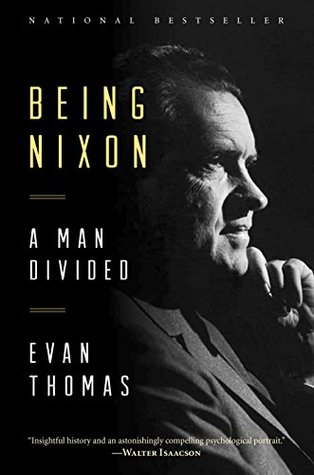More on this book
Community
Kindle Notes & Highlights
“Can you imagine,” asked Henry Kissinger, “what this man would have been like if somebody had loved him?”26 Kissinger was exaggerating for effect, but Nixon’s insecurities seem so profound that he must, as a child, have lacked for some essential assurance.
as a husband and father, Nixon would not abide conflict in his own home. He always wanted to hear up-beat music, symphonies and show tunes, even through dinner and wanted to hear only cheerful conversation. Acutely sensitive to moods, he would abruptly and insistently end any family conflict by saying, “Oh, there’s no problem.”
There is the insecure Nixon who never got over the social slights of his youth; then there is the resilient Nixon who rose above the snobs and shaped his own persona. Both are the real Nixon: He used anxiety to create strength, but a brittle strength.
Nixon observed that the blacks in Durham lived in a separate and unequal world, waiting on tables and working in the factories, speaking only when spoken to. Other students from outside the South were bothered by the strict segregation, but only Nixon spoke out about it, recalled several of his classmates, one of whom noted, “He looked upon the issue as a moral issue and condemned it as such.”
Yet he was a good officer. He took an interest in his men, helping them write letters home and to transfer to better postings, bucking up morale, taking off his shirt and pitching in to load airplanes on the way to the battle zone.
In later years, more than one officer compared him to the sympathetic, thoroughly decent character played by Henry Fonda in the play and movie, Mr. Roberts.22
Nixon’s true education in profanity came as a green young officer commanding rough Seabees and Marines in the South Pacific.
He sent home about $6,000 (roughly $80,000 in 2014 dollars) in poker winnings, far more than his lieutenant’s pay.23
When he arrived home in San Diego in the summer of 1944 after fourteen months overseas, Pat later recounted, she “ran to the airport gate and threw her arms around him in all-encompassing embrace.”
One wonders how someone who preferred to be alone, who often seemed so ill at ease in company, chose as his life’s calling a profession that requires constant attention to others—in the stereotype of the classic pol, endless glad-handing, schmoozing, shoulder-squeezing, and baby-kissing.
Despite the jolt of World War II, the nation’s capital in 1946 was still a small, somewhat Southern town, inbred and hierarchical.2 Lacking seniority, Nixon was denied a coveted seat on the Judiciary Committee. Knowing no one, unsure of his place, not a member of any “in” group, Nixon, as ever, made do. He didn’t need the Franklins; he
On the Education and Labor Committee, Nixon took his seat at the very end of the Republican side of the table. At the opposite end sat another newly elected navy veteran, Congressman John F. Kennedy of Massachusetts, last man on the Democrats’ lineup. “We were like a pair of unmatched bookends,” Nixon recalled. Kennedy was all languid grace and lofty manners, a prince of the city,
On the Capital Limited train back to Washington that night, Nixon and Kennedy drew straws for the lower berth (“this time I won,” recalled Nixon). They “sat up late,” talking about domestic issues and especially foreign policy, the subject they both most cared about.
Both men had lost golden older brothers; both felt the heavy burdens of parental expectation. “We shared one quality which distinguished us from most of our fellow congressmen,” Nixon recalled. “Neither of us was a backslapper, and we were uncomfortable with boisterous displays of superficial camaraderie.
In Washington society at that time, “informal” meant a tuxedo; “formal” meant white tie and tails.6
One can only imagine the tense smiles on the faces of the carefully, nicely, but inappropriately dressed “greenest congressman” and his wife. It was one of those embarrassing, awkward moments that rubbed raw Nixon’s feelings of alienation, just under the skin.
Apparently wishing to make sure work would be balanced with play, Nixon’s new friend, Jack Kennedy, gave Nixon the names and addresses of three young ladies in Paris. “I don’t think Mr. Nixon even took the numbers away with him,” recalled his secretary, Dorothy Cox. “He was far too embarrassed.”9
Nixon’s anticommunism was not just a politically useful stance. After the Herter Committee trip, it deepened into conviction.10
America was at that moment on the verge of becoming the world’s great superpower, and Nixon understood that his political future lay as an internationalist, not as an isolationist.


